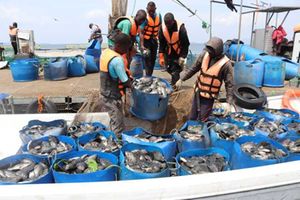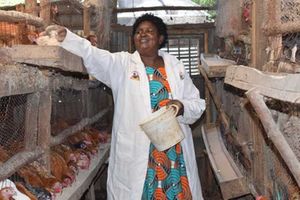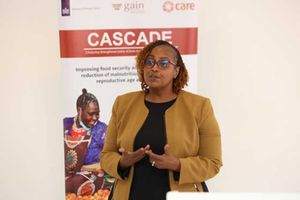
Ann Wambui Njoroge at her poultry farm in Joska, Machakos County on June 5, 2025.
When Ann Wambui, 33, was growing up, she was inspired by her grandmother’s chicken farm on the outskirts of the city. Born and raised in Nairobi, Wambui recalls how, even though her mother also kept poultry for home consumption, it was her grandmother’s methods that truly fascinated her.
“From a young age, I was curious about where food comes from—especially poultry products,” she says. “Because of space limitations in the urban setup, sometimes the chickens would sleep under visitors’ beds. That really inspired me to follow in my grandmother’s footsteps, but using modern poultry practices.”

Ann Wambui Njoroge at her poultry farm in Joska, Machakos County on June 5, 2025.
Determined to make her dream a reality, Wambui began by researching about how to rear chicken online. TikTok was one of her learning platforms, which she says introduced her to a wide range of poultry farming practices.
“I discovered that Kenchic offers training on proper poultry farming, and I enrolled in their classes,” she recalls. “It was a great learning experience.”
Kenchic is a producer of poultry products, including eggs, chicks, and mature birds for meat. From the training, Wambui learned that what her grandmother lacked was knowledge in biosecurity—measures that include proper housing, feeding, and poultry health management. Armed with new skills and knowledge, she and her husband decided to venture into poultry farming in 2024.
“We had a piece of idle land that we used to grow kales and beetroots. We converted it into a chicken farm,” she says.
The 50-by-100-foot parcel, located in Joska off Kangundo Road in Machakos County, was the starting point. Shifting from vegetable farming to poultry farming required significant investment, and she reveals that they raised Sh1.5 million in seed capital from their savings to kick-start the venture.
“We began with 1,500 chicks,” Wambui explains, pointing out that she lost 60 birds at eight weeks due to a stampede. “When researching online, you only learn one side of the story. Continuous training and capacity building are key.”
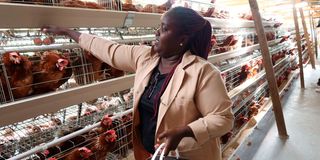
Ann Wambui Njoroge collects eggs at her poultry farm in Joska, Machakos County on June 5, 2025.
More than a year later, Wambui says the growth of her business has been tremendous. Her farm now hosts about 3,000 birds, primarily layers – chickens raised for egg production. A visit to the facility greets visitors with the clucking of chickens at various stages of growth, from chicks to mature birds.
“When I hear those sounds, I feel like a happy farmer does. It tells me my birds are healthy,” she said during an interview with Seeds of Gold.
The young farmer is especially keen on biosecurity and traceability—tracking the origin and health of her chicken and their products. Biosecurity involves all measures taken to prevent the introduction, spread, or exit of disease-causing organisms within a poultry farm. This includes restricting access to poultry houses, disinfecting equipment, isolating sick or new birds, managing litter and waste properly, and controlling pests such as rodents and wild birds.
“It’s also about maintaining hygiene and preventing contact between flocks of different ages,” says Kenchic’s Chief Commercial Officer, Philip Maina. “We emphasise training farmers in biosecurity because those who follow the measures see better flock health, growth rates, and overall profitability. It’s a habit that protects not just one farm—but the entire poultry ecosystem.”
Maina adds that Kenchic has developed a digital app to support farmers with flock management, training resources, and good farming practices. The company also offers a WhatsApp chatbot that provides real-time support, making professional advice accessible even to smallholder farmers in remote areas.
“Farmers should always source chicks from reliable, vaccinated suppliers. Vaccinated chicks are protected from contagious diseases like Gumboro, Marek’s, and Newcastle, which reduces early mortality and boosts flock performance,” he advises.
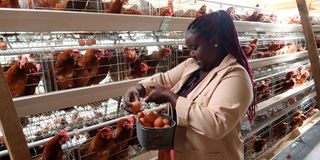
Ann Wambui Njoroge collects eggs at her poultry farm in Joska, Machakos County on June 5, 2025.
Wambui is keen on every stage of poultry growth, especially during brooding, when temperature control is critical for chicks. She has employed a farm assistant to help with daily operations. In the mornings, they feed the birds, clean the cages and feeding equipment, and collect chicken droppings for use as manure in their kitchen garden. Feeding is done three times a day, and eggs are collected in the afternoon.
With an average daily collection of 45 trays of eggs, which are sold at market rates, Wambui serves clients in Machakos, Nairobi, and Kajiado.
“Our first customers are our neighbours, friends, and nearby shop owners,” she says.
Record keeping—including data on water, feed, production, sales, health, and vaccinations—is central to her operations and ensures traceability.
“Poultry farming is a business like any other. Keeping diligent records helps you monitor growth, solve problems, and maintain a detailed history,” she explains.
As the world commemorates World Food Safety Day – observed on June 7 annually – Wambui underscores the importance of traceability in ensuring safe food for consumers.
“Clean egg handling, quality feed, hygienic cages, regular vaccinations and medication are my secrets to keeping my customers satisfied. They know they are getting safe poultry products,” she says, noting the vital role that youth and women are playing in modernising poultry farming to support a healthier nation.
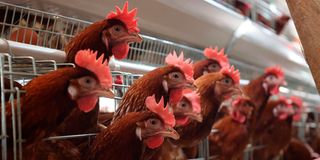
Ann Njoroge's chicken at her poultry farm in Joska, Machakos County on June 5, 2025.
Her journey, however, has not been without challenges.
Wambui, who holds a Diploma in Culinary Arts, cites the rising cost of livestock feed as a major hurdle.
Despite this, she remains determined.
“Even as I urge the government to address the high cost of feed, I am not giving up. My story is inspiring a younger generation—including my nephews and my employee, who are now actively involved in poultry farming.”

